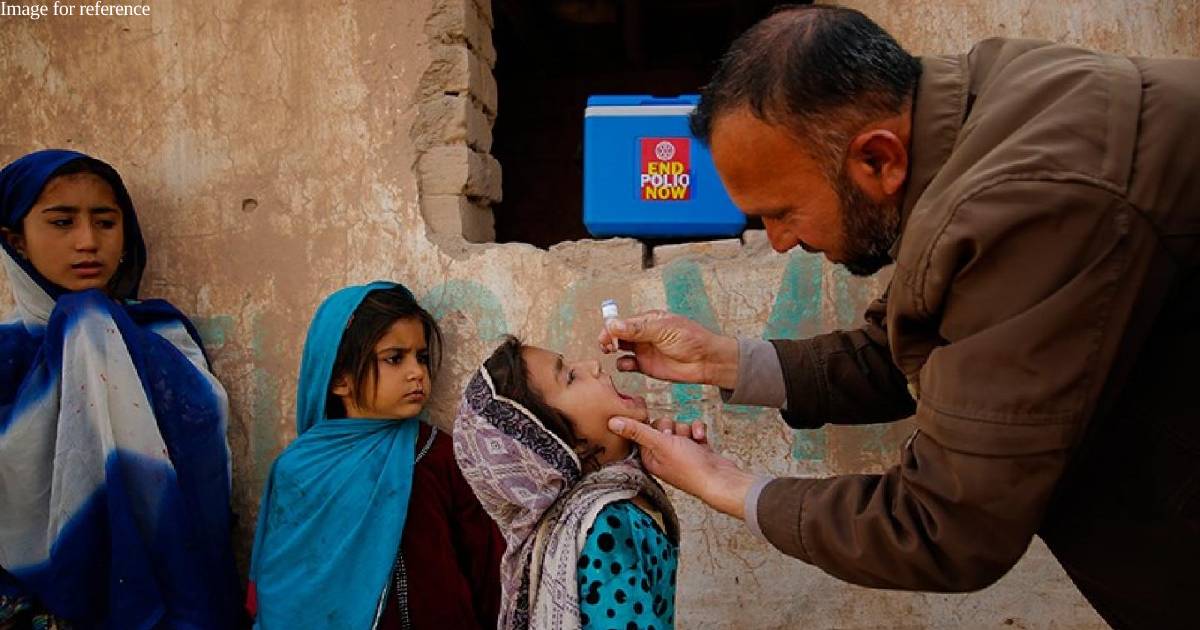Pakistan: This year's 15th case of wild poliovirus detected in North Waziristan

Islamabad: A 17-month-old boy from the North Waziristan tribal district of Pakistan contracted the wild poliovirus disease, the National Institute of Health (NIH) said on Saturday.
With another case detected, the tally of total cases in the country rose to 15 this year. According to an NIH official, all victims this year are aged under two years, and the only case outside North Waziristan was reported from Lakki Marwat last month, Dawn reported. Last month, an 18-month-old was paralyzed by wild poliovirus in Pakistan's northwestern Khyber Pakhtunkhwa province (KP).
The spokesperson of the health ministry earlier said that the cases of more polio infections are suspected to surge as viral circulation is expected to increase from the months of May to September.
According to an NIH statement, the country's polio eradication programme has continued immunization campaigns wherever possible despite adverse weather.
The ongoing national anti-polio vaccination drive started on Aug 22 and health workers continue to reach children in all accessible areas, braving heavy rains and floods, Dawn reported.
However, the country's failure to eliminate polio reflects the acute lack of commitment and obligation on the part of the government and society toward saving children from the menace of this devastating disease.
Despite receiving substantial foreign funding and carrying out several campaigns for countering polio over the years, there have been some serious lapses in the state's efforts to address this pernicious health problem, a media report said.
Moreover, despite numerous supplementary immunization campaigns, the failures in Pakistan's polio eradication campaigns are now obscuring the global scenario for a polio-free world.
The problem is rooted in financial and organizational deficits, as well as active conflict and insecurity, which has caused the persistent failure of effective immunization campaigns in the country.
Pakistan reported this year's first case on April 22 after staying polio-free for almost 15 months. It detected only one case last year.
Polio is a highly infectious disease caused by poliovirus and mainly affects children aged under five years. It enters the nervous system and causes paralysis and even death. Since there is no cure for the disease, vaccination is the most effective protection against it.
Burt interestingly, in many cases, the family members show reluctance towards vaccination. Most parents refuse to administer polio drops to their children due to misapprehension about the vaccine. They believe that it will harm or sterilize their children.
Parents mainly refuse to immunize their children due to a lack of awareness, doubts regarding vaccine quality, misunderstandings related to vaccination, and low confidence in vaccinators.
While repeated immunisations have protected millions of children from polio, allowing almost all countries to become polio-free, Pakistan is one of two countries, together with neighbouring Afghanistan, where polio is still endemic, though case numbers have dropped drastically in recent years. However, Nigeria, the third country on the list, officially eradicated wild polio in 2020.
Pakistan and Afghanistan have faced significant security challenges along the border, including targeted attacks on polio workers and security guards and an absolute ban on polio immunization in certain areas. Diffidence in the region is often listed as a significant hindrance to polio eradication, reported Global Start View.
Many polio workers and security personnel have lost their lives in the past years during polio vaccination campaigns, and such incidents have been one of the major reasons that polio is still endemic in Pakistan.
According to media reports, as many as 70 polio workers have been killed in terrorist attacks since 2012, mainly in the province of Khyber Pakhtunkhwa, reported Global Strat View. (ANI)

.png)
.png)
.png)
.jpg)

.jpg)
.jpg)
.jpg)
.jpg)
.jpg)

.jpg)
.jpg)
.jpg)
.png)
.jpg)
.jpg)
.jpg)
.png)
.png)
